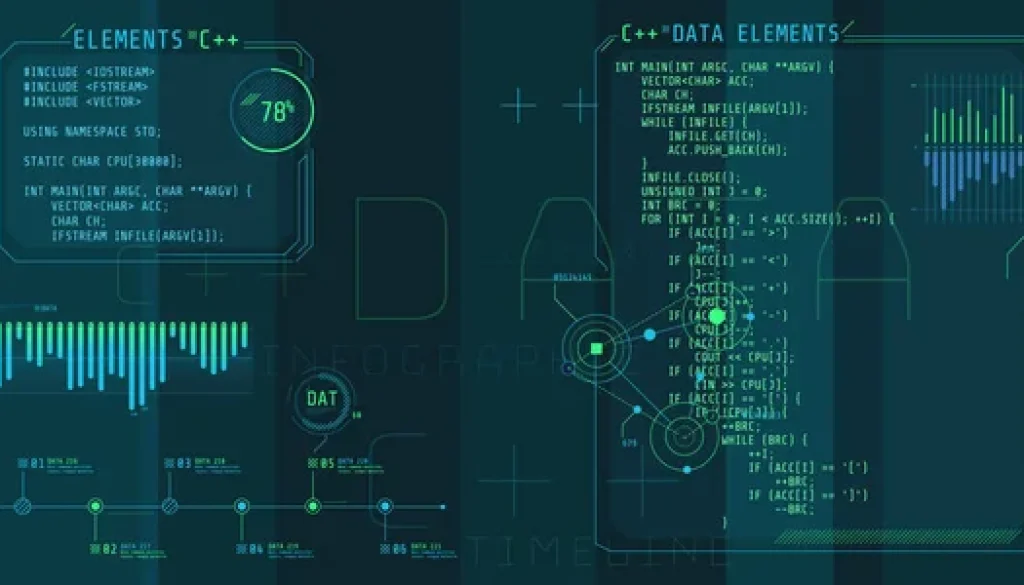Mastering the C++ Programming Language: A Comprehensive Guide

In the ever-transforming realm of programming languages, C++ persists in its significance and endurance. If you aspire to become a virtuoso in this adaptable language, you’ve landed in the correct place. Within this exhaustive handbook, we will delve into the intricacies of C++ to equip you with the wisdom and proficiency required to excel in your programming pursuits.
The Fundamentals of C++
Understanding the Roots
C++, often denoted as “C plus plus,” materialized as an expansion of the C programming language. Bjarne Stroustrup, during the early 1980s at Bell Labs, orchestrated its genesis, rendering it one of the most time-honored, yet tenacious programming languages. The name of the language itself signifies the gradual evolution it underwent since its inception.
C++ germinated from Stroustrup’s aspiration to augment C by incorporating attributes that would amplify the effectiveness and sustainability of software development. This evolution introduced the integration of object-oriented programming principles into the language’s fabric, empowering developers to engender well-structured and modular code.
Read about AI in Finance Unlocking the Potential: Artificial Intelligence in Finance
Versatility and Performance
C++ perseveres in its eminence for a multitude of reasons. Its utility spans an extensive spectrum, from system programming and game development to high-frequency trading platforms. The language’s superlative performance and efficiency designate it as the prime choice for resource-intensive applications.
In the domain of game development, C++ maintains supremacy, enabling the maximization of performance and control over hardware. Prominent game engines such as Unreal Engine and Unity heavily rely on C++ to furnish the meteoric graphics and physical simulations that contemporary gamers demand.
In the financial sector, where fractions of a second can determine profit or loss, C++ reigns as the preferred language for high-frequency trading platforms. Its low-level capabilities and real-time responsiveness are unparalleled, rendering it the quintessential instrument for these pivotal applications.
Moreover, C++ garners substantial utilization in scientific computation, a sphere where precision and performance hold paramount importance. Libraries such as the Boost C++ Libraries present a wide array of tools for diverse mathematical and scientific applications, firmly establishing C++ as an indispensable lingua franca within this realm.
Object-Oriented Paradigm

C++ has attained renown for its unwavering endorsement of the object-oriented programming paradigm. This endorsement empowers developers to model tangible entities and their interactions within the code, culminating in more methodical and sustainable software.
Within the domain of object-oriented programming, data and functions are enveloped within objects, which are endowed with the ability to communicate. This approach simplifies the management of complex software endeavors by fragmenting them into more manageable constituents.
The nucleus of C++’s object-oriented design revolves around the concepts of classes and objects. A class delineates the prototype for an object, prescribing its attributes (data members) and functions (member functions). Objects, in turn, embody instances of these classes, facilitating the creation and manipulation of data in an orderly and structured manner.
Read about 5G Autonomous Vehicles Navigating the Future: 5G Autonomous Vehicles
Key Concepts
To attain mastery in C++, one must apprehend fundamental concepts encompassing variables, data types, operators, and control structures. These serve as the foundational elements of the language, and a robust grounding in these domains proves pivotal.
Variables: Variables assume the role of data repositories. In C++, it becomes imperative to announce a variable with a specified data type, such as int (for integers), double (for floating-point numbers), or char (for characters).
Data Types: C++ endorses a wide spectrum of data types, incorporating rudimentary types like int, float, and char, as well as bespoke types constructed through classes.
Operators: Operators, represented by symbols, execute operations on variables and values. C++ encompasses arithmetic operators (e.g., + and -), comparison operators (like == and !=), and logical operators (such as && and ||).
Control Structures: Control structures manage the flow of your program. These encompass conditional statements (if, else, switch) and loops (for, while, do-while).
Advanced C++ Techniques
Classes and Objects
In C++, classes function as the blueprint for fabricating entities. They encapsulate data and methodologies, delivering an organized method to depict intricate entities. Adeptness in handling classes and entities is pivotal in the terrain of C++ development.
Classes confer the capability to forge bespoke data types customized to the requisites of your application. By articulating the attributes and behaviors of these classes, a lucid and logical framework for your code transpires.
Within the universe of software development, classes extend the means to emulate corporeal entities and their interactions. For instance, in a gaming project, one might devise classes to emulate characters, artifacts, and adversaries. Each class is imbued with its unique attributes (such as vitality or velocity) and methods (e.g., attacking or relocating).
Object-oriented programming within the purview of C++ fosters code recyclability and modularity. Upon fabricating a class, it serves as a template for spawning multiple instances of that class. This methodology streamlines code upkeep and accelerates the development process.
Templates

Blueprints exemplify a potent facet of C++ that facilitates the formation of generic types and functions. They empower you to compose adaptable and reusable code. Proficiency in wielding blueprints can appreciably elevate your programming efficacy.
C++ blueprints empower you to contrive code adaptable to diverse data types. Instead of crafting functions or classes tailored to particular types, blueprints enable the crafting of a singular version that adapts to myriad data types during compilation.
For instance, a blueprint function can be authored to arrange an assortment of elements. This function accommodates the sorting of integers, floating-point numbers, or even proprietary types. The compiler fabricates suitable code for the specific data type integrated with the blueprint, guaranteeing both versatility and performance.
C++ blueprints find widespread utilization within the Standard Template Library (STL), a potent assortment of algorithms and data structures that simplify complex operations such as searching, sorting, and the management of data collections. Mastery of blueprints empowers the full exploitation of the STL’s potential, thus streamlining your programming chores.
Memory Management
C++ confers unmediated authority over memory governance, permitting efficient allocation and deallocation of resources. However, this authority bears immense responsibility. Comprehending memory oversight is critical to forestalling memory leaks and optimizing program efficiency.
Memory management in C++ entails dynamic allocation of memory using operators like “new” and “malloc.” This affords the creation of variables or data structures within the heap, which possesses a more flexible lifespan than stack-based memory.
Manual deallocation becomes imperative when memory is allocated manually. Neglecting to relinquish memory could result in memory leaks, a gradual encroachment upon available memory, ultimately causing program slowdown or crashes.
Smart pointers, such as std::shared_ptr and std::unique_ptr, are offered by C++, automating memory management. Leveraging smart pointers can avert memory leaks and render your code more resilient.
Exception Handling
Exception handling in C++ introduces a structured approach to addressing errors and unforeseen occurrences. Competency in this domain fosters more resilient and fault-tolerant software.
Additional links
FAQs about C++
1. What is the significance of C++ in modern programming?
- C++ remains significant due to its versatility and efficiency, making it a preferred choice for various applications, including game development, financial software, and scientific computing.
2. Who developed the C++ programming language?
- C++ was developed by Bjarne Stroustrup in the early 1980s at Bell Labs.
3. How does C++ differ from the C programming language?
- C++ extends upon C by incorporating object-oriented programming principles, enabling more organized and modular code.
4. Why is C++ the language of choice for game development?
- C++ excels in game development due to its ability to maximize performance and control over hardware, which is essential for delivering high-quality graphics and physics simulations.
5. What is object-oriented programming in C++?
- Object-oriented programming in C++ involves modeling real-world objects and their interactions within the code, resulting in more organized and maintainable software.
6. What are some key concepts in C++ that programmers should grasp?
- Programmers should understand concepts like variables, data types, operators, and control structures, which form the building blocks of the language.
7. How do classes and objects work in C++?
- Classes serve as blueprints for creating objects, allowing developers to encapsulate data and methods, which results in more structured and intuitive code.
8. What are templates in C++ and why are they important?
- Templates allow the creation of generic types and functions in C++, enhancing code flexibility and reusability.
9. How does C++ handle memory management, and why is it important to understand this aspect?
- C++ provides control over memory management, enabling efficient allocation and deallocation of resources. Understanding memory management is crucial to prevent memory leaks and optimize program performance.
10. What is exception handling in C++ and why is it important for software development?
Exception handling in C++ provides a structured approach to handling errors and unexpected events, enhancing the robustness and fault tolerance of software.
MCQs about C++

1. What is the primary reason C++ maintains its significance in the programming world?
a) Simplicity and ease of learning
b) Strong emphasis on web development
c) Versatility and efficiency
d) Integration with artificial intelligence
2. Who is the creator of the C++ programming language?
a) Linus Torvalds
b) Dennis Ritchie
c) Bjarne Stroustrup
d) Tim Berners-Lee
3. What distinguishes C++ from the C programming language?
a) C++ uses a more extensive character set
b) C++ has better memory management
c) C++ incorporates object-oriented programming principles
d) C++ is primarily used for web development
4. In which domain does C++ excel due to its performance and hardware control capabilities?
a) Mobile application development
b) Graphic design
c) Game development
d) Data analysis
5. What is the primary benefit of object-oriented programming in C++?
a) Improved memory management
b) Simplified syntax
c) More organized and maintainable code
d) Faster code execution
6. What are the fundamental building blocks of the C++ programming language that programmers must grasp?
a) Functions and classes
b) Data types, classes, and operators
c) Control structures and memory allocation
d) Classes and objects
7. Which concept in C++ allows for the creation of custom data types and facilitates code reusability?
a) Inheritance
b) Templates
c) Polymorphism
d) Encapsulation
8. How does C++ handle memory management?
a) It relies on automatic memory allocation
b) It doesn’t manage memory; the operating system does
c) Memory management is the responsibility of the programmer
d) C++ provides tools like smart pointers for memory management
9. What is the purpose of exception handling in C++?
a) It is used to handle syntax errors in the code
b) It facilitates code optimization
c) It helps in dealing with errors and unexpected events in a structured manner
d) It enables real-time debugging
10. Which programming language is a direct precursor to C++?
a) Python
b) C#
c) C
d) Java
Answers:
- c) Versatility and efficiency
- c) Bjarne Stroustrup
- c) C++ incorporates object-oriented programming principles
- c) Game development
- c) More organized and maintainable code
- b) Data types, classes, and operators
- b) Templates
- d) C++ provides tools like smart pointers for memory management
- c) It helps in dealing with errors and unexpected events in a structured manner
- c) C



